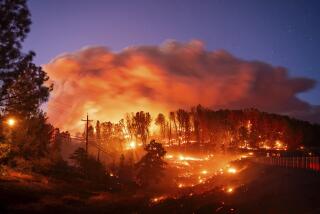Taliban exploits Afghan riots over Koran burning
- Share via
Reporting from Kabul, Afghanistan — One clear beneficiary has emerged from the wave of deadly riots that swept Afghanistan after members of a Florida evangelical church burned a copy of the Koran: the Taliban.
The insurgents, according to Afghan and Western officials, have been able to exploit the ongoing tumult, using the riots as cover for attacks against Western and government targets and reaping propaganda benefits by allying themselves with popular fury over the desecration of the Muslim holy book.
Moreover, the violence has fueled tensions among NATO allies, Western diplomats say, sparked as it was by an American figure, albeit a fringe one. The riots have tapped a well of anti-foreign and particularly anti-American sentiment that exists even among Afghans who do not condone the deaths that have occurred.
On Sunday, Afghans took to the streets for a third straight day, in Jalalabad and Kandahar, to protest the March 20 burning of a copy of the Koran by followers of Terry Jones, a pastor based in Gainesville, Fla. Officials in Kandahar reported at least two more deaths and dozens of injuries; the Jalalabad protest, though angry and impassioned, was largely peaceful.
The latest fatalities brought the three-day death toll to 22: seven U.N. workers and four demonstrators killed Friday when rioters stormed their compound in Mazar-i-Sharif after mosque preachers inveighed against the Koran burning, and at least nine people killed in daylong rioting Saturday in Kandahar, the spiritual home of the Taliban movement.
The protests, which have touched virtually every major Afghan city, not only showed the hair-trigger sensibilities associated with any insult to Islam in this deeply conservative society but also illustrated the gulf between Western and Afghan precepts regarding free speech and civil liberties.
Many Afghans, including some sophisticated urban dwellers, were baffled that what they considered an overt act of blasphemy could be deemed a permissible expression of political opinion.
“How can you do something that you know is going to cause violence and not be held accountable?” said Sayeed Humayoun, a Kabul teacher. “Even my littlest pupils know better than this.”
President Hamid Karzai, as so often happens, appeared caught between the expectations of his Western patrons and the desire to avoid appearing complicit with foreigners at the expense of his own people. He offered condolences over the U.N. deaths even as he reiterated demands Sunday that those involved in the Koran burning be punished.
The Taliban had no need to tread any such fine line. In a statement Sunday, the movement depicted the West as infidels and Karzai’s security forces as “hirelings” doing foreigners’ bidding in their attempts to quell the violence.
Senior Western officials in Afghanistan have been urgently seeking Karzai’s assistance in calming passions. U.S. Ambassador Karl Eikenberry, together with Army Gen. David H. Petraeus, the American commander of Western forces in Afghanistan, and Mark Sedwill, the senior NATO civilian representative, met with Karzai, the president’s office said Sunday.
The White House, meanwhile, may have unwittingly inflamed tensions with an indirect reference to beheading in retribution for religious insult — a highly fraught topic because decapitations are sometimes associated with Islamic extremism.
“The desecration of any holy text, including the Koran, is an act of extreme intolerance and bigotry,” President Obama said in a statement Saturday. He added: “No religion tolerates the slaughter and beheading of innocent people, and there is no justification for such a dishonest and deplorable act.”
The United Nations denied that any beheadings occurred during the assault on the compound in Mazar-i-Sharif. An early assertion by one Afghan police official that at least two of the foreigners killed had been decapitated was widely disseminated before being denied by others more familiar with events at the compound.
The chief of the U.N. mission in Afghanistan, Staffan de Mistura, told reporters in Kabul on Saturday that all seven victims, including the four guards, had gunshot wounds.
Both Afghan and Western officials cited mounting evidence that insurgents had seized the opportunity to infiltrate crowds of demonstrators in both Kandahar and Mazar-i-Sharif, concealing themselves among those who otherwise might have marched relatively peacefully.
De Mistura said the three Europeans who died in the Mazar-i-Sharif compound were not victims of random mob violence but were hunted down in the bunker where they had taken refuge. Afghan officials, who have made dozens of arrests in connection with the assault, said evidence so far suggested that the main instigators were allied with the insurgency.
The Western alliance has publicly presented a united front in the face of the violence, unequivocally condemning the killings while criticizing any desecration of religious texts. But some European diplomats have sought to distance themselves from what they privately describe as an American-inspired crisis.
U.N. officials have asserted repeatedly that the world body’s compound in Mazar-i-Sharif presented a target of convenience.
“The demonstration did not attack the American Consulate … because the American Consulate has not been opened yet, and it was diverted instead toward the U.N. building,” De Mistura told reporters. He called the Koran burning an “insane and totally despicable gesture by one person.”
More to Read
Sign up for Essential California
The most important California stories and recommendations in your inbox every morning.
You may occasionally receive promotional content from the Los Angeles Times.










